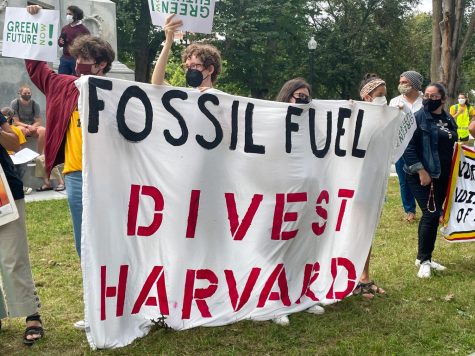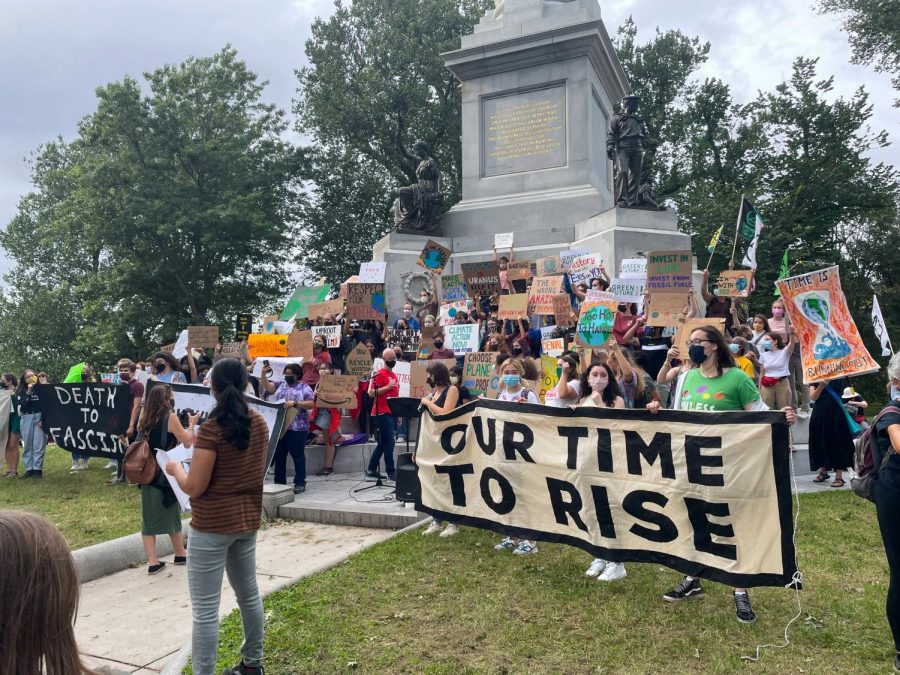Climate activists gathered in the Boston Public Garden on Sept. 24 as part of a global movement to fight for intersectional climate justice.
The event was one of the 1,000 simultaneous protests coordinated by the organization, Fridays for Future, a youth-led and organized global climate strike movement started by Greta Thunberg.
Once the event started, protestors made their way up Beacon Street toward the State House, where there was a face-off with a separate rally that was protesting vaccine mandates. The groups shouted chants while facing each other. Officers stood in between to separate the groups.
The climate strike comes at an important time, especially for Massachusetts, as key climate reform bills, such as the H.3292 bill, are currently sitting idly in the State House with little activity on the matter. According to the Mass Legislature website, H.3292 proposes the formation of a “Green Infrastructure Fund,” which would divert funds to invest in green infrastructure and further efforts to reduce greenhouse gas emissions.
Chants such as “Hey hey! Ho ho! Fossil fuels have got to go,” and “Climate Justice,” rang clear through the streets as the protestors made their way down the route.

The march came to an end at the Soldiers and Sailors monument in Boston Common, where people settled in to listen to the speakers that addressed the crowd.
One speaker was Jade Woods, an organizer of Fossil Fuels Divest Harvard, which led the call that eventually pushed Harvard University to divest from its nearly $41 billion endowment from the fossil fuel industry.
Woods spoke of her hometown of Baton Rouge, LA, which is currently facing a major climate crisis as the state is predicted to be completely underwater in the next few decades.
Woods brought up the alarming comparisons between Louisiana and the Massachusetts coastline, which also faces extreme devastation if corporations and governments do not effectively try to mitigate the effects of climate change. She emphasized just how important it is for all people to push for state legislation that supports important climate justice measures.
“We need to stop tabling discussions about climate change for a later date because that date is now. There are tangible ways that the state legislature can work to help the climate crisis and protect those in the most vulnerable communities,” Woods said.
The march brought together climate activists of all ages and backgrounds. One protester was even entirely clad in a polar bear suit, referencing the threat polar bears face as the ice caps in the Arctic continue to melt.
Many also voiced the need to stop the Line 3 pipeline, which is aging and slated to be replaced by a new pipeline capable of transporting more oil, according to Enbridge’s website.
The pipeline that stretches 1,031 miles over Northern Minnesota is contested by tribal and environmental groups for crossing into land that is occupied by Indigenous communities, leaving them vulnerable to spills from the pipeline, according to Minnesota Public News.
Reggi Alkiewicz, one of the other speakers from the event representing the North American Indian Center, expressed their faith in the protesters who were present.
“We know what we need to do. We know that we need to change. We know that the ones here are going to shake everything up,” Alkiewicz said.














